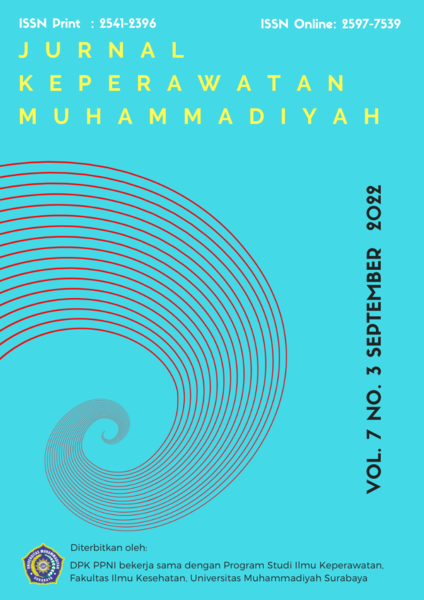FAMILY SUPPORT BERHUBUNGAN DENGAN KEPATUHAN MINUM OBAT PADA PASIEN TUBERCULOSIS DI WILAYAH KERJA PUSKESMAS KEBONSARI KOTA SURABAYA
DOI:
https://doi.org/10.30651/jkm.v7i3.17853Kata Kunci:
Family support, adherence to medication, TuberculosisAbstrak
Objective: Compliance  with  taking  medication  is  still  a  problem  that  oftenoccurs in the treatment of tuberculosis patients, so that it is not uncommon for patients to take their treatment incomplete, this is evidenced by the percentage of incomplete treatment in Indonesia which is 13% and in the city of Surabaya itself is 44.6%. For this reason, good family support is needed to improve medication adherence. This study aims to analyze the relationship between family support and medication adherence in tuberculosis patients in the working area of the Kebonsari Public Health Center, Surabaya
Methods: The research method uses a correlation analytic design with a cross sectional approach. The sample in this study was 30 respondents who were in the working area of the Kebonsari Health Center. Sampling using Non Probability Sampling with Total Sampling sampling technique. The research instrument used a family support and compliance questionnaire. Data analysis used the Spearman Rank Test correlation test with the help of SPSS 23.
Results: The results of the univariate analysis showed that the characteristics of each variable measured were gender (46.7% male; 53.3% female), education (40% elementary school; 33.3% junior high school; 16.7% senior high school; 10% undergraduate), and   employment   (mostly   household   and   private households, namely 33,3%). The results of the bivariate analysis showed that there  was  a  strong  relationship  between  family  support  and  adherence  to medication in tuberculosis patients in the working area of the Kebonsari Health Center (Ï = 0.000 < = 0.05 with a correlation value of 0.622), meaning that there was a strong relationship and a positive relationship, the better. Family support, the better the adherence to taking medication for TB patients, namely respondents who have good compliance as many as 14 respondents (46.7%) and as many as 21 respondents (70%) have good family support.
Conclusion:Â Therefore, families are expected to accompany patients for treatment to the puskesmas, pay attention to the patient's food and daily needs, remind patients when it is time to take medicine (PMO), give love and affection, and support patients to remain optimistic about their recovery and remind them to always pray to God for healing. given healing.Referensi
Ahsan, A, dan Putu Ari Sandhu Permana Hany. 2012. Hubungan Dukungan Keluarga dengan Kepatuhan Minum Obat pada Pasien Hipertensi di Poli Jantung RSSA Malang. Tesis.
Bungin, B. 2010. Metode Penelitian Kuantitatif: Komunikasi, Ekonomi, dan Kebijakan Publik serta Ilmu-ilmu Soial Lainnya. Jakarta: Kencana. Diakses tanggal 22 oktober 2020 dari https://tbindonesia.or.id/informasi/tentang-tbc/situasi-tbc-diindonesia-2/
Dinas Kesehatan Provinsi Jawa Timur. 2020. Profil Kesehatan JATIM 2019. Surabaya: Dinas Kesehatan Provinsi Jawa Timur. Diakses tanggal 3 Februari 2021 dari https://dinkes.jatimprov.go.id
Dinas Kesehatan Kota Surabaya. 2020. Profil Kesehatan 2019. Surabaya: Dinas Kesehatan Kota Surabaya. Diakses tanggal 2 Februari 2021 dari https://dinkes.surabaya.go.id
Friedman, M. 2010. Buku Ajar Keperawatan Keluarga: Riset, teori, dan praktik Ed 5. Jakarta: EGC
Friedman, M. 2010. Buku Ajar Keperawatan Keluarga: Riset, Teori dan Praktik. Edisi 5. Jakarta: EGC.
Friedman.2012.Keperawatan keluarga. Yogyakarta: Gosyen Publishing
Maulidia, D. F. 2014. Hubungan Antara Dukungan Keluarga dan Kepatuhan Minum Obat pada Penderita Tuberkulosis di Wilayah Ciputat Tahun 2014. Skripsi. Jakarta: Universitas Islam Negeri Syarif Hidayatullah Jakarta
Mongi, R. A. 2016. Gambaran Persepsi Penderita Tentang Penyakit Kusta dan Dukungan Keluarga pada Penderita Kusta di Kota Manado. Skripsi. Universitas Sam Ratulangi
Ni Made,dkk. 2016. Pengaruh Dukungan Keluarga Terhadap Kepatuhan Minum Obat Pada Penderita Tuberkulosis Di Puskesmas Motoboi Kecil Kota Kotamobagu Notoatmodjo S. 2012. Promosi Kesehatan dan Perilaku Kesehatan. Jakarta: PT Rineka Cipta.
Nursalam. (2016). Metodologi Penelitian Ilmu Keperawatan: Pendekatan Praktis. Ed. 4. Jakarta: Salemba Medika
Supriyanto,AA. 2017. Hubungan peran keluarga dengan depresi penderita kusta. Skripsi. Stikes Insan Cendekia Medika Jombang Van Den Berg, R.H. dan M.J.
Viljoen. 2007. Communicable disease;A Nursing perspective. Cape Town:CTP Book Printers WHO. 2003. Adherence To LongTerm Therapies Evidance For Action. https://apps.who.int/iris/bitstream/10665/42682/1/9241545992.pdf
WHO. 2013. Countdown To 2015 Global Tuberculosis Report 2013 Supplement Report Of Global TB Control Glick, I.D, Anya .H. Stekoll, dan Spenche Hays. 2011. The Role Of The Family And Improvement In Treatment For Schizophrenia. Journal Of Clinical Psychopharmacology Volume 31, No.1, February 2011
Gough, A dan Garri Kautman. 2011. Pulmonary Tuberculosis: Clinical Features And Patient Management. Nursing Standard. July 27: Vol 25, No.47, Page 485
Unduhan
Diterbitkan
Terbitan
Bagian
Lisensi
- Penulis tetap memegang hak atas karyanya dan memberikan hak publikasi pertama kepada jurnal ini yang secara simultan karya tersebut dilisensikan di bawah:Â Creative Commons Attribution-ShareAlike 4.0 International (CC BY-SA 4.0)













